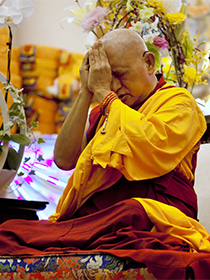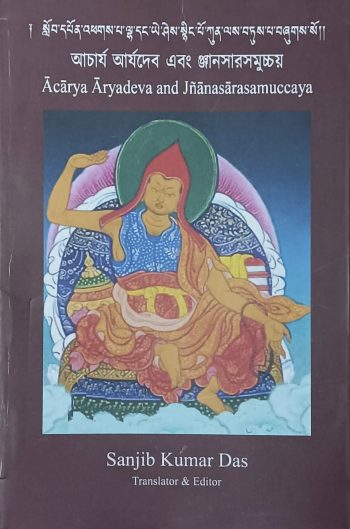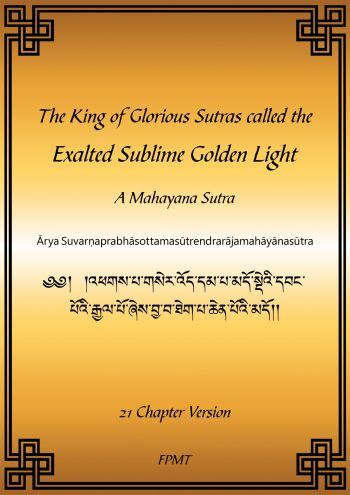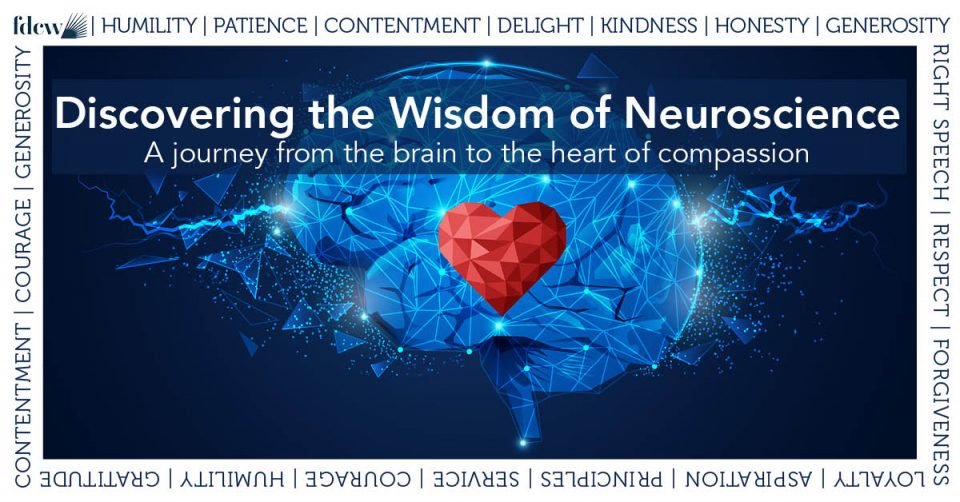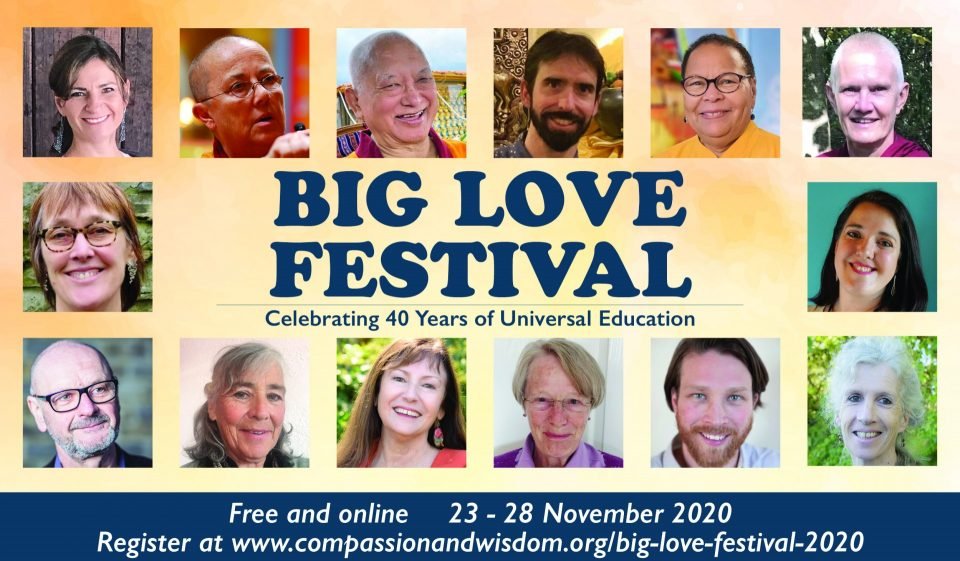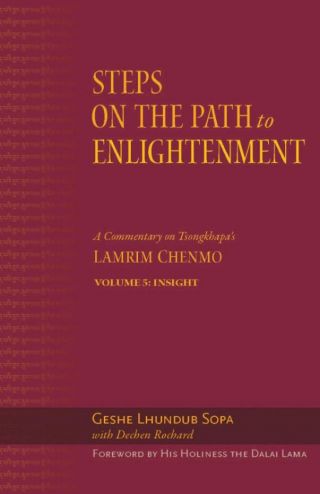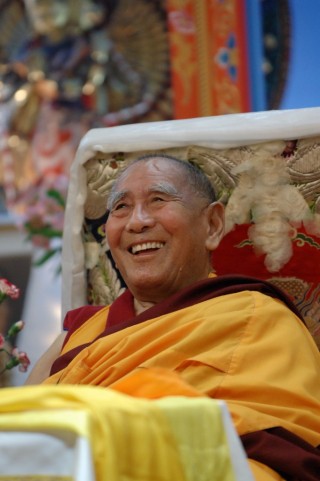- Home
- FPMT Homepage
Foundation for the Preservation of the Mahayana Tradition
The FPMT is an organization devoted to preserving and spreading Mahayana Buddhism worldwide by creating opportunities to listen, reflect, meditate, practice and actualize the unmistaken teachings of the Buddha and based on that experience spreading the Dharma to sentient beings. We provide integrated education through which people’s minds and hearts can be transformed into their highest potential for the benefit of others, inspired by an attitude of universal responsibility and service. We are committed to creating harmonious environments and helping all beings develop their full potential of infinite wisdom and compassion. Our organization is based on the Buddhist tradition of Lama Tsongkhapa of Tibet as taught to us by our founders Lama Thubten Yeshe and Lama Thubten Zopa Rinpoche.
- Willkommen
Die Stiftung zur Erhaltung der Mahayana Tradition (FPMT) ist eine Organisation, die sich weltweit für die Erhaltung und Verbreitung des Mahayana-Buddhismus einsetzt, indem sie Möglichkeiten schafft, den makellosen Lehren des Buddha zuzuhören, über sie zur reflektieren und zu meditieren und auf der Grundlage dieser Erfahrung das Dharma unter den Lebewesen zu verbreiten.
Wir bieten integrierte Schulungswege an, durch denen der Geist und das Herz der Menschen in ihr höchstes Potential verwandelt werden zum Wohl der anderen – inspiriert durch eine Haltung der universellen Verantwortung und dem Wunsch zu dienen. Wir haben uns verpflichtet, harmonische Umgebungen zu schaffen und allen Wesen zu helfen, ihr volles Potenzial unendlicher Weisheit und grenzenlosen Mitgefühls zu verwirklichen.
Unsere Organisation basiert auf der buddhistischen Tradition von Lama Tsongkhapa von Tibet, so wie sie uns von unseren Gründern Lama Thubten Yeshe und Lama Thubten Zopa Rinpoche gelehrt wird.
- Bienvenidos
La Fundación para la preservación de la tradición Mahayana (FPMT) es una organización que se dedica a preservar y difundir el budismo Mahayana en todo el mundo, creando oportunidades para escuchar, reflexionar, meditar, practicar y actualizar las enseñanzas inconfundibles de Buda y en base a esa experiencia difundir el Dharma a los seres.
Proporcionamos una educación integrada a través de la cual las mentes y los corazones de las personas se pueden transformar en su mayor potencial para el beneficio de los demás, inspirados por una actitud de responsabilidad y servicio universales. Estamos comprometidos a crear ambientes armoniosos y ayudar a todos los seres a desarrollar todo su potencial de infinita sabiduría y compasión.
Nuestra organización se basa en la tradición budista de Lama Tsongkhapa del Tíbet como nos lo enseñaron nuestros fundadores Lama Thubten Yeshe y Lama Zopa Rinpoche.
A continuación puede ver una lista de los centros y sus páginas web en su lengua preferida.
- Bienvenue
L’organisation de la FPMT a pour vocation la préservation et la diffusion du bouddhisme du mahayana dans le monde entier. Elle offre l’opportunité d’écouter, de réfléchir, de méditer, de pratiquer et de réaliser les enseignements excellents du Bouddha, pour ensuite transmettre le Dharma à tous les êtres. Nous proposons une formation intégrée grâce à laquelle le cœur et l’esprit de chacun peuvent accomplir leur potentiel le plus élevé pour le bien d’autrui, inspirés par le sens du service et une responsabilité universelle. Nous nous engageons à créer un environnement harmonieux et à aider tous les êtres à épanouir leur potentiel illimité de compassion et de sagesse. Notre organisation s’appuie sur la tradition guéloukpa de Lama Tsongkhapa du Tibet, telle qu’elle a été enseignée par nos fondateurs Lama Thoubtèn Yéshé et Lama Zopa Rinpoché.
Visitez le site de notre Editions Mahayana pour les traductions, conseils et nouvelles du Bureau international en français.
Voici une liste de centres et de leurs sites dans votre langue préférée
- Benvenuto
L’FPMT è un organizzazione il cui scopo è preservare e diffondere il Buddhismo Mahayana nel mondo, creando occasioni di ascolto, riflessione, meditazione e pratica dei perfetti insegnamenti del Buddha, al fine di attualizzare e diffondere il Dharma fra tutti gli esseri senzienti.
Offriamo un’educazione integrata, che può trasformare la mente e i cuori delle persone nel loro massimo potenziale, per il beneficio di tutti gli esseri, ispirati da un’attitudine di responsabilità universale e di servizio.
Il nostro obiettivo è quello di creare contesti armoniosi e aiutare tutti gli esseri a sviluppare in modo completo le proprie potenzialità di infinita saggezza e compassione.
La nostra organizzazione si basa sulla tradizione buddhista di Lama Tsongkhapa del Tibet, così come ci è stata insegnata dai nostri fondatori Lama Thubten Yeshe e Lama Zopa Rinpoche.
Di seguito potete trovare un elenco dei centri e dei loro siti nella lingua da voi prescelta.
- 欢迎 / 歡迎
简体中文
“护持大乘法脉基金会”( 英文简称:FPMT。全名:Foundation for the Preservation of the Mahayana Tradition) 是一个致力于护持和弘扬大乘佛法的国际佛教组织。我们提供听闻,思维,禅修,修行和实证佛陀无误教法的机会,以便让一切众生都能够享受佛法的指引和滋润。
我们全力创造和谐融洽的环境, 为人们提供解行并重的完整佛法教育,以便启发内在的环宇悲心及责任心,并开发内心所蕴藏的巨大潜能 — 无限的智慧与悲心 — 以便利益和服务一切有情。
FPMT的创办人是图腾耶喜喇嘛和喇嘛梭巴仁波切。我们所修习的是由两位上师所教导的,西藏喀巴大师的佛法传承。
繁體中文
護持大乘法脈基金會”( 英文簡稱:FPMT。全名:Found
ation for the Preservation of the Mahayana Tradition ) 是一個致力於護持和弘揚大乘佛法的國際佛教組織。我們提供聽聞, 思維,禪修,修行和實證佛陀無誤教法的機會,以便讓一切眾生都能 夠享受佛法的指引和滋潤。 我們全力創造和諧融洽的環境,
為人們提供解行並重的完整佛法教育,以便啟發內在的環宇悲心及責 任心,並開發內心所蘊藏的巨大潛能 — 無限的智慧與悲心 – – 以便利益和服務一切有情。 FPMT的創辦人是圖騰耶喜喇嘛和喇嘛梭巴仁波切。
我們所修習的是由兩位上師所教導的,西藏喀巴大師的佛法傳承。 察看道场信息:
- FPMT Homepage
- News/Media
-
- Study & Practice
-
-
- About FPMT Education Services
- Latest News
- Programs
- New to Buddhism?
- Buddhist Mind Science: Activating Your Potential
- Heart Advice for Death and Dying
- Discovering Buddhism
- Living in the Path
- Exploring Buddhism
- FPMT Basic Program
- FPMT Masters Program
- FPMT In-Depth Meditation Training
- Maitripa College
- Lotsawa Rinchen Zangpo Translator Program
- Universal Education for Compassion & Wisdom
- Online Learning Center
-
- Prayers & Practice Materials
- Overview of Prayers & Practices
- Full Catalogue of Prayers & Practice Materials
- Explore Popular Topics
- Benefiting Animals
- Chenrezig Resources
- Death & Dying Resources
- Lama Chopa (Guru Puja)
- Lama Zopa Rinpoche: Compendium of Precious Instructions
- Lama Zopa Rinpoche: Life Practice Advice
- Lama Zopa Rinpoche Practice Series
- Lamrim Resources
- Mantras
- Prayer Book Updates
- Purification Practices
- Sutras
- Thought Transformation (Lojong)
- Audio Materials
- Dharma Dates - Tibetan Calendar
- Translation Services
- Publishing Services
- Ways to Offer Support
- Prayers & Practice Materials
-
- Teachings and Advice
- Find Teachings and Advice
- Lama Zopa Rinpoche Advice Page
- Lama Zopa Rinpoche: Compendium of Precious Instructions
- Lama Zopa Rinpoche Video Teachings
- ༧སྐྱབས་རྗེ་བཟོད་པ་རིན་པོ་ཆེ་མཆོག་ནས་སྩལ་བའི་བཀའ་སློབ་བརྙན་འཕྲིན།
- Podcasts
- Lama Yeshe Wisdom Archive
- Buddhism FAQ
- Dharma for Young People
- Resources on Holy Objects
- Teachings and Advice
-
-
*If a menu item has a submenu clicking once will expand the menu clicking twice will open the page.
-
-
- Centers
-
- Teachers
-
- Projects
-
-
-
-
*If a menu item has a submenu clicking once will expand the menu clicking twice will open the page.
-
-
- FPMT
-
-
-
-
-
Many times we mix our compassion with attachment. We begin with compassion, but after some time, attachment mixes in and then it becomes an attachment trip.
Lama Thubten Yeshe
-
-
-
- Shop
-
-
-
The Foundation Store is FPMT’s online shop and features a vast selection of Buddhist study and practice materials written or recommended by our lineage gurus. These items include homestudy programs, prayers and practices in PDF or eBook format, materials for children, and other resources to support practitioners.
Items displayed in the shop are made available for Dharma practice and educational purposes, and never for the purpose of profiting from their sale. Please read FPMT Foundation Store Policy Regarding Dharma Items for more information.
-
-
Education and Preservation Fund News
12
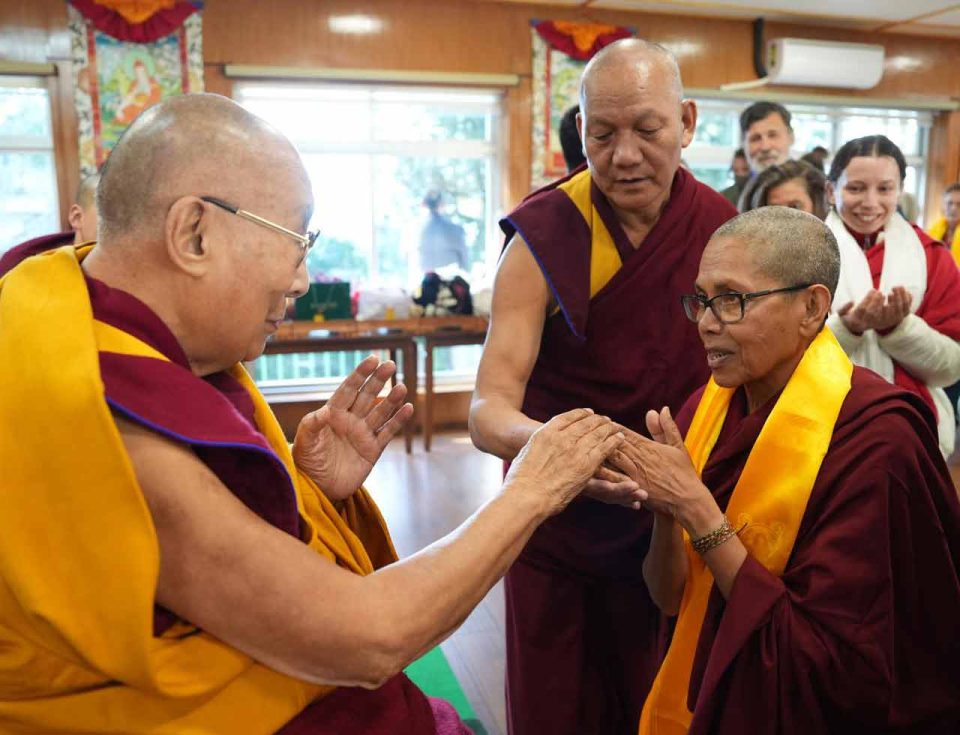
Ven. Lekdron with His Holiness the Dalai Lama, who granted His blessings for the documentary film project, Five Prominent Historical Mahayana Buddhist Sites in Sri Lanka, Dharamsala, December 2024.
In 2025, the FPMT Education and Preservation Fund continued its mission to safeguard and share the profound teachings of the Mahayana tradition by awarding a total of US$13,300 in grants. These contributions supported a diverse range of projects – from translation and publication efforts to teacher development and multimedia initiatives – each aligned with Lama Zopa Rinpoche’s vision of making the Dharma accessible, inclusive, and transformative across cultures and generations.
Documentary in Sri Lanka | The Six Perfections in Italy | Dharma Teachers | Revival in Bengal | Thank you
Preserving Mahayana Buddhist Heritage in Sri Lanka
In 2025, the FPMT Education and Preservation Fund contributed US$7,000 to support a landmark initiative led by Ven. Tenzin Lekdron and the Tara Lanka FPMT Study Group, dedicated to preserving and illuminating Sri Lanka’s rich Mahayana Buddhist heritage through the production of a documentary film. This grant funded the pre-production phase of “Five Prominent Historical Mahayana Buddhist Sites in Sri Lanka,” laying the groundwork for a full-scale exploration of Mahayana Buddhism’s presence and influence on the island.
Although widely recognized as a Theravada country, Sri Lanka also nurtured vibrant Mahayana traditions, particularly during the Anuradhapura period (377 BCE to 1017 CE). The documentary seeks to uncover this underappreciated history, bringing together archaeological evidence, and cultural research. Through interviews with scholars, historians, and practitioners, the film will highlight the depth and diversity of Sri Lanka’s Buddhist heritage, offering a broader and more unified view of Buddhist traditions.
The project’s early milestones have already demonstrated its significance. In October 2024, a Medicine Buddha Puja at Mahiyangana Temple drew over 2,000 participants, followed in December by His Holiness the Dalai Lama blessing the Medicine Buddha statue and the project itself.
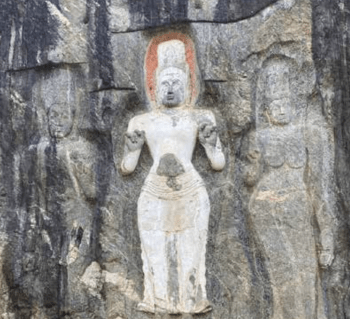
Buddhas on Rocks, one of the sites featured in the documentary.
Pre-production activities have focused on extensive research, site access permissions, and collaboration with Sri Lankan ministries and cultural institutions, along with engagement of local AV teams and international documentary producers. These efforts ensure that the forthcoming film will be both historically rigorous and culturally sensitive. Featured sites include Rajagala Stupa in Ampara, where unaltered stupas reveal Mahayana architectural principles from the Manjusri Bhasita Vastuvidya Sastra (ancient Buddhist architectural manual); Buduruwagala, home to extraordinary rock carvings of Mahayana deities such as Vajrapani and Manjushri; and Mahiyangana Temple, a site visited by the Buddha and now witnessing a revival of Mahayana practice.
The project has received strong endorsements, including from Senior Venerable Phuoc Tan Thich, Abbot of Quang Minh Temple in Vietnam, who praised its potential to foster healing and unity across traditions while recognizing Ven. Lekdron’s leadership and vision.
Looking ahead, the completed documentary will be screened globally at FPMT centers and broadcast on public television in Sri Lanka and Australia. It is expected to encourage pilgrimages and retreats to the featured sites, support scholarly symposiums between Mahayana and Theravada communities, and contribute to the publication of previously overlooked Mahayana texts.
Bringing the Six Perfections to Italy
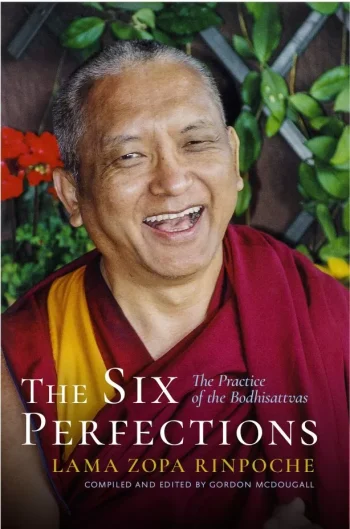
The Six Perfections cover.
In 2025, the FPMT Education and Preservation Fund proudly supported a meaningful initiative in Europe: the Italian translation of Lama Zopa Rinpoche’s profound work, The Six Perfections, with a grant of US$1,500. This project, led by Nalanda Edizioni, is more than a publishing effort – it’s a cultural bridge, a spiritual offering, and a legacy in motion.
Tibetan Buddhism, while growing in popularity, remains underrepresented in Italy. Nalanda Edizioni has long served as a vital conduit for making authentic Dharma teachings accessible to Italian-speaking practitioners – both those affiliated with FPMT centers and independent students seeking spiritual depth.
This year’s focus on The Six Perfections is especially timely. As Ven. Sangye Khadro beautifully put it, the book is: “a jewel… full of practical advice on how we can start working on these six precious practices, even if we are not yet bodhisattvas.” The translation will offer Italian readers a clear, compassionate guide to cultivating generosity, ethics, patience, joyous effort, concentration, and wisdom – core pillars of the Mahayana path.
The grant from FPMT covers the translation phase, ensuring the text’s spiritual and linguistic integrity. All other phases – editing, typesetting, printing, and distribution – are being self-funded by Nalanda Edizioni or supported through a crowdfunding campaign, a model that has proven successful in their past projects.
With many Italian FPMT centers and growing interest from other Buddhist institutions, Nalanda Edizioni is well-positioned to distribute the translated text widely. Their e-commerce platform and active digital presence (including newsletters and social media) ensure that even those in remote areas can access these teachings.
The project also strengthens the broader mission of FPMT: to preserve and spread the Mahayana tradition. By making Lama Zopa Rinpoche’s teachings available in Italian, this initiative nurtures a new generation of practitioners and honors the enduring legacy of our beloved teacher.
Empowering Dharma Teachers
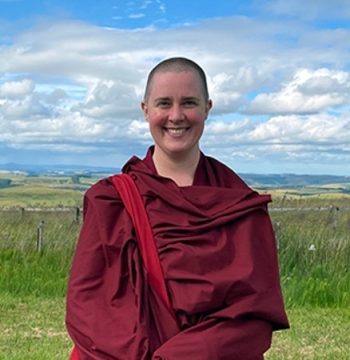
Ven. Lozang Yönten from Maitripa College.
In July 2025, Maitripa College has hosted the Teacher Development and Support Seminar (TDSS), a transformative gathering for Dharma educators made possible by a US$3,000 grant from the FPMT Education and Preservation Fund. Designed to uplift the next generation of Buddhist teachers, the seminar will combine traditional Dharma transmission with modern pedagogical tools, digital literacy, and cultural sensitivity, ensuring that teachers are equipped to meet the needs of today’s diverse and global community.
Led by Ven. Lozang Yönten and Namdrol Adams, Ed.D., and shaped through consultation with experienced educators such as Don Handrick, Ven. Connie Miller, and Andy Wistreich, the seminar will address the challenges Dharma teachers face in balancing tradition with innovation.
The FPMT grant helped to remove financial barriers for participants, making it possible for dedicated Sangha and lay teachers ( many of whom serve as volunteers) to attend.
Reviving Mahayana Wisdom in Bengal
In 2024, the FPMT Education and Preservation Fund supported the Department of Indo-Tibetan Studies at Visva-Bharati University in their mission to revive Mahayana Buddhism in Bengal. Led by the late Professor Sanjib Kumar Das, the team translated foundational Mahayana texts into Bengali, including the Prajñādaṇḍa, Jñānasārasamuccaya, and Dharmadharmatāvibhaṅga, as well as Ārya-prajñāpāramitā-vajrapāṇi-mahāyāna-sūtra, Ārya-prajñāpāramitā-vajraketu-mahāyāna-sūtra, and Nagarjuna’s Yuktiṣaṣṭikākārikā. These efforts helped reconnect Bengali-speaking practitioners with their rich Buddhist heritage and laid the groundwork for future scholarship.
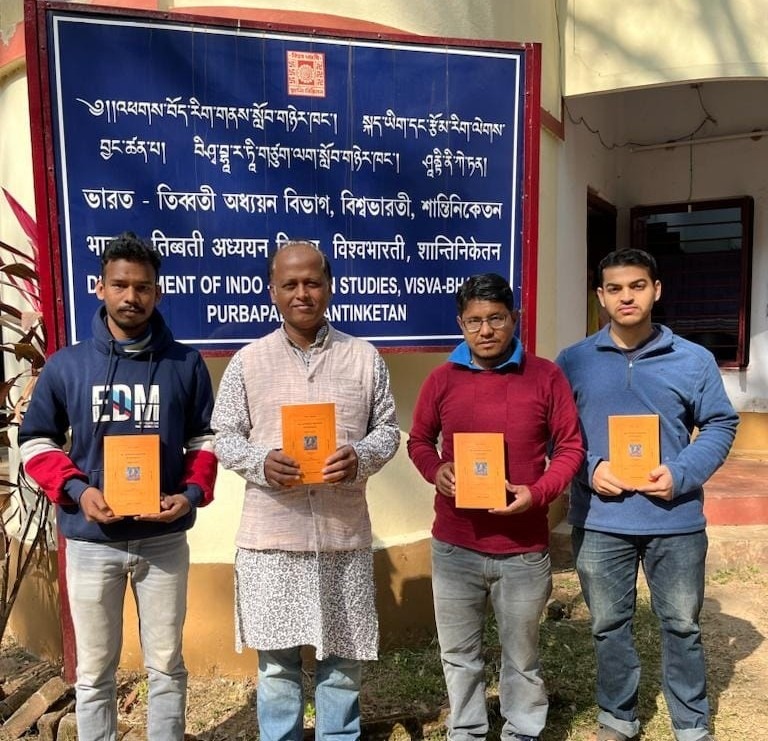
The team of Bengali translators at Visva-Bharati University. With the late Professor Sanjib Kumar Das (second from the left)
This year, the department continues its vital work with a new translation project: Ācārya Aśvaghoṣa’s Vajrasūcī, a powerful text that challenges caste-based hierarchies and affirms the universal potential for spiritual awakening. The project is led by Dr. Debajit Chatterjee and Dr. Norbu Gyaltsen Negi, who aim to translate the Tibetan version of the Vajrasūcī into Bengali for the first time.
The Vajrasūcī, a blend of poetry and prose, contains 53 verses and commentary that refute the concept of Brāhmaṇa as a birth-based spiritual elite. Its message is especially relevant in today’s context, offering a timeless reminder of the Buddha’s radical inclusivity and compassion. Despite its significance, the Vajrasūcī has never been translated into Bengali.
The project has received US$1,800 from the FPMT Education and Preservation Fund to support the translation and publication process.
Thank you!
These projects supported in 2025 reflect FPMT’s commitment to preserving the Mahayana tradition and expanding its reach in meaningful ways. From reviving ancient texts in Bengali and Italian, to empowering Dharma teachers, each initiative contributes to a vibrant and compassionate future for Buddhist learning and practice.
We extend our deepest gratitude to all scholars, educators, translators, and practitioners whose dedication continues to bring the Dharma to life for communities around the world!
To support or learn more about the Education and Preservation Fund, and all of our FPMT Charitable Projects that are working to build a more compassionate world.
20
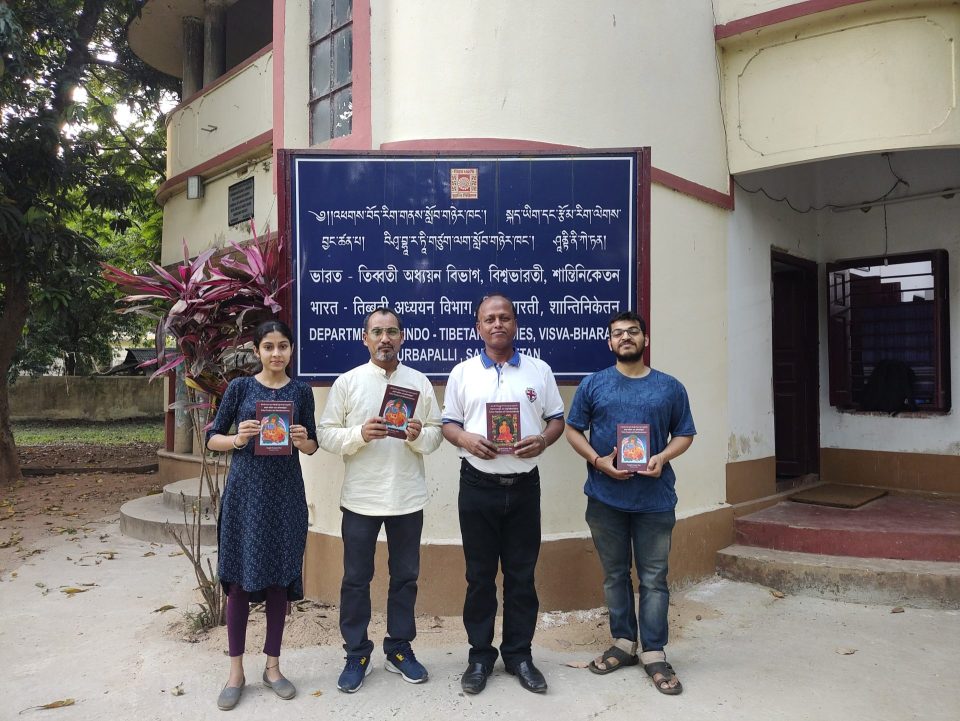
Professor Sanjib Kumar Das (third from the left) and his team in 2024.
The Education and Preservation Fund supports Dharma study and contributes to the development of Buddhist education programs and the preservation of the Dharma through the publication of Dharma practice materials and translations.
The fund also supports the publishing of the vast archive of Lama Zopa Rinpoche’s teachings and contributes to important initiatives that preserve the Dharma and the Mahayana tradition as identified by Lama Zopa Rinpoche.
In 2024, the Education and Preservation Fund supported three key translation projects aimed at making Buddhist teachings more accessible across linguistic and cultural boundaries.
Bengali and English Translations
Recipient: Indo-Tibetan Translation Group at Visva-Bharati University led by the late Prof. Sanjib Kumar Das
Visva-Bharati University – founded in 1921 by Nobel Laureate Rabindranath Tagore – is a central university and institution of national importance situated in Santiniketan, West Bengal. Conceived as a place where education, culture, and nature converge, it continues to embody Mr. Tagore’s vision of holistic human development.
At the heart of Visva-Bharati’s mission lies the preservation and translation of ancient texts – an endeavor essential for safeguarding the spiritual and philosophical heritage of India and the wider Buddhist world. Translation here is more than a linguistic pursuit: it is a bridge across generations, cultures, and communities. It ensures that timeless wisdom can speak anew to diverse audiences, keeping the profound teachings of the past both relevant and accessible.
Historically, Bengal was a vibrant center of Buddhist scholarship, home to renowned figures like Shantarakshita and Atisha, and closely linked to institutions like Nalanda. However, the destruction of Nalanda in the 12th century led to a sharp decline in Buddhist practice and literature in the region.
In 2024, with the support of the FPMT Education and Preservation Fund, three important texts were translated into Bengali and English:
- Prajñādaṇḍa (Eng. The Staff of Wisdom)
- Jñānasārasamuccaya (Eng. Aryadeva’s Compendium of the Essence of Wisdom)
- Dharmadharmatāvibhaṅga (Eng. Distinguishing Phenomena and Pure Being)
These texts offer deep insights into Buddhist ethics, wisdom, and the nature of reality, and are foundational to Mahayana philosophy.
With deep sadness, the Indo-Tibetan Translation Group at Visva-Bharati University announces the passing of Professor Sanjib Kumar Das on June 14, 2025, after a courageous six-month battle with pancreatic cancer. Professor Sanjib Kumar Das was the guiding spirit of the Revival of Mahayana Buddhism in Bengal project, supported by FPMT and Lama Zopa Rinpoche. Between 2021 and 2024, under his leadership, the group translated significant Tibetan Buddhist texts into Bengali and other Indian languages. Even in the midst of his illness, he continued working alongside his students on a final translation – an enduring testament to his dedication.
We extend our heartfelt condolences to his family and his team, who shared in his vision and tireless work.
Bengali Translation of Mahayana Sutras and Philosophical Treatise
Recipient: Bengali Department of Indo-Tibetan Studies at Visva-Bharati University led by Dr. Debajit Chatterjee and Dr. Norbu Gyaltsen Negi
The Bengali Department of Indo-Tibetan Studies at Visva-Bharati University, led by Dr. Norbu Gyaltsen Negi and Dr. Debajit Chatterjee, is undertaking a translation project focused on three key Madhyamaka Buddhist texts:
- Ārya-prajñāpāramitā-vajrapāṇi-mahāyāna-sūtra (Eng. The Noble Mahāyāna Sūtra of the Perfection of Wisdom with Vajrapāṇi)
- Ārya-prajñāpāramitā-vajraketu-mahāyāna-sūtra (Eng. The Noble Mahāyāna Sūtra of the Perfection of Wisdom with Vajraketu)
- Nagarjuna’s Yuktiṣaṣṭikākārikā (Eng. Sixty Verses on Reasoning)
Among the texts, two are Perfection of Wisdom sutras – emphasizing emptiness and wisdom through the Bodhisattvas Vajrapāṇi and Vajraketu – while the Yuktiṣaṣṭikā, a seminal work by Nāgārjuna, presents a systematic analysis of emptiness through reasoning at the heart of the Madhyamaka tradition.
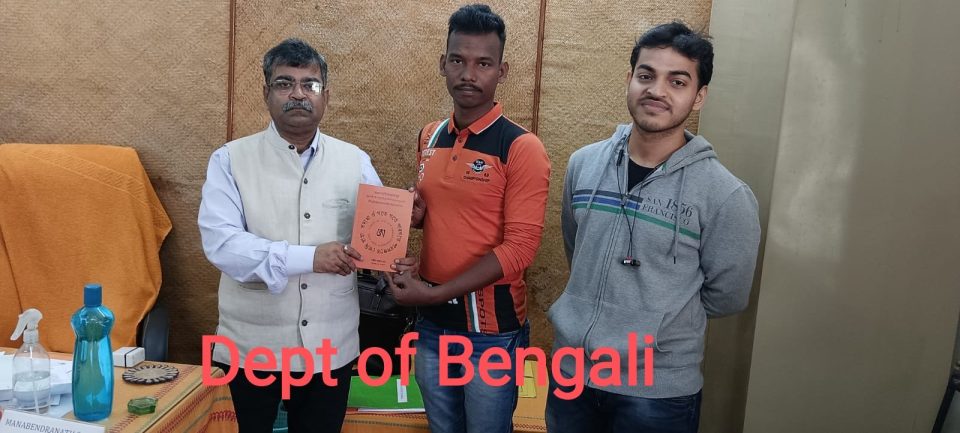
Bengali Department of Indo-Tibetan Studies at Visva-Bharati University.
These works are foundational to Mahayana thought and their translation into Bengali opens access to a broader audience of practitioners and scholars.
Sinhala Translation of “Liberation in the Palm of Your Hand” by Pabongka Rinpoche
Recipient: Tara Lanka FPMT Study Group led by Ven. Lekdron and Upul Bandara
In response to a request from Lama Zopa Rinpoche, the Tara Lanka FPMT Study Group in Sri Lanka has undertaken the translation of the core Lam Rim text, the Liberation in the Palm of Your Hand by Pabongka Rinpoche, into Sinhala language. This project began in June 2022 and is expected to be completed by mid-2025.
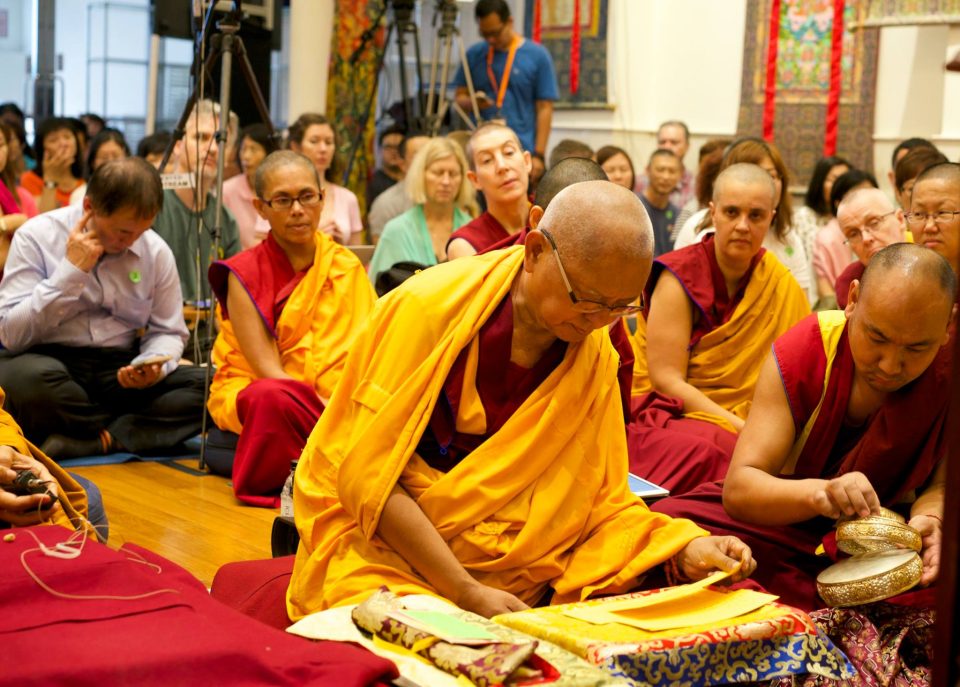
Ven. Lekdron (behind Rinpoche) with Lama Zopa Rinpoche. Photo courtesy of Ven. Lekdron.
The translation is led by Upul Bandara, a seasoned translator with over 20 years of experience, including work for the Sri Lankan Parliament and the studybuddhism.com platform. Editorial guidance is provided by Bertram Liyanage, a Dharmakirti expert and current PhD student at Temple University (Pennsylvania, United States).
This effort is deeply aligned with Rinpoche’s vision of making Mahayana teachings accessible to Sri Lankan practitioners. The project has progressed steadily despite limited resources, with initial funding personally covered by Ven. Tenzin Lekdron, a Sri Lankan nun and the project initiator.
The translation promises to significantly enhance understanding of Mahayana Buddhism in Sri Lanka, fulfilling Rinpoche’s aspiration to bring the Lam Rim teachings to a wider audience.
In 2024, the Education and Preservation Fund awarded a total of US$9,771 to support vital translation projects across South Asia. These efforts are crucial for preserving ancient knowledge systems, enabling comparative philosophical studies, fostering intercultural dialogue, and empowering regional communities through access to spiritual literature in their native languages. We extend our heartfelt thanks to the translators and scholars whose dedication continues to make the Dharma accessible to all. These projects reflect the core mission of the Fund: to preserve, translate, and share the teachings of the Buddha for the benefit of present and future generations. This work continued in 2025 with additional grants offered to support important preservation projects. We will share details of these 2025 grants in an upcoming report.
Learn more about the Education and Preservation Fund, and all of our FPMT Charitable Projects that are working to build a more compassionate world.
24
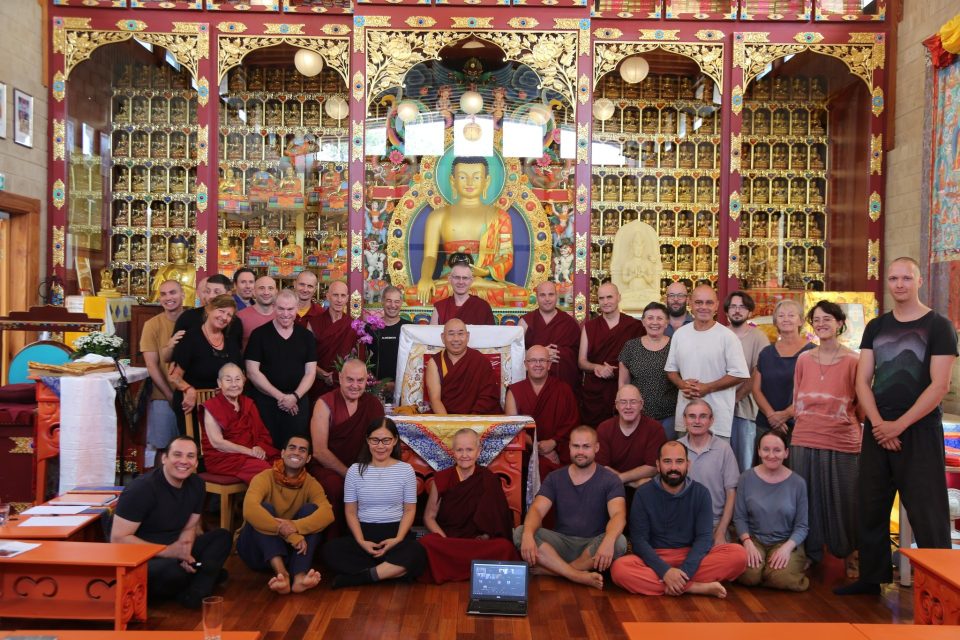
FPMT Basic Program students at Nalanda Monastery, France.
In 2023, an incredible US$173,156 was disbursed in grants from the FPMT Education and Preservation Fund to promote the development of Buddhist education programs and the preservation of the Dharma through the publication of Buddhist practice materials and translations. We invite you to read some of the activities supported this year below and rejoice!
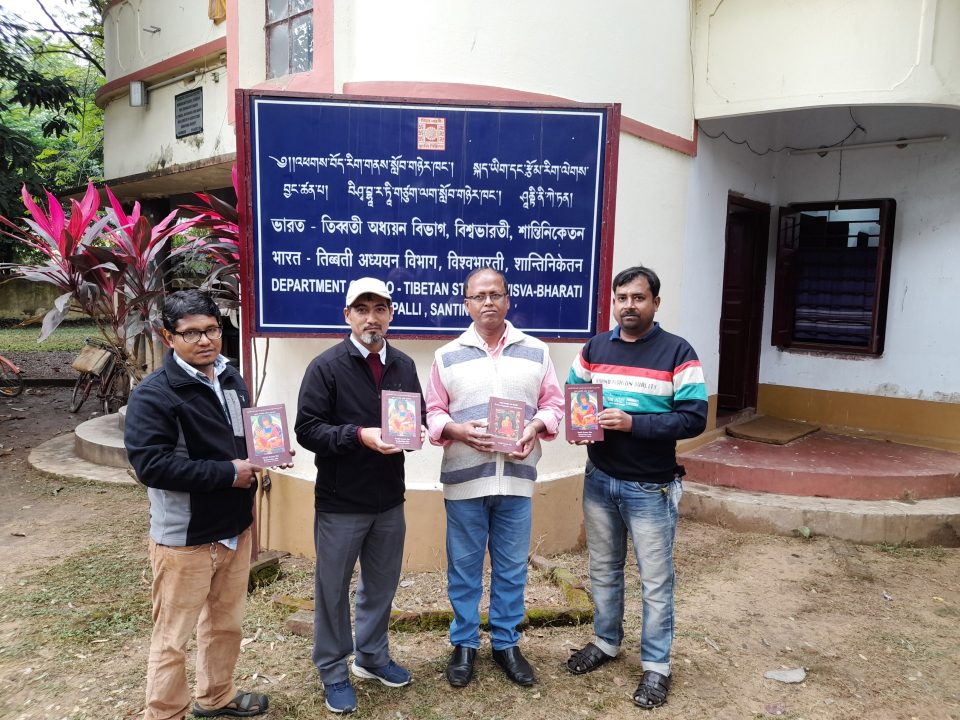
Santiniketan Bengali Translation Team with newly translated Bhavanakrama text. Visva-Bharati University, Department of Indo-Tibetan Studies, West Bengal, India.
- US$4,607 in grants were provided for translation projects of Dharma texts from Tibetan into Bengali and Hindu, to the Indo-Tibetan Translation Team at Visva-Bharati University of West Bengal, India. West Bengal was the birthplace of great masters such as Shantideva, Lama Atisha, and Shantarakshita, and the intention for the translation projects was to aid in the revival of Mahayana Buddhism in the region. One of the translations sponsored was the Bengali translation and editing of Bhavanakrama by Kamalashila. The other translation from Tibetan to Bengali and English was of Bodhipathapradipam (Atisha’s Lamp of the Path to Enlightenment), Suhrllekha (Nagarjuna’s Letter to a Friend), and The Thirty-Seven Practices of the Bodhisattva. The books were completed by teams of university translators and advisors. The translated Bhavanakrama text was also offered to His Holiness the Dalai Lama in Bodhgaya recently.
- Further grants were given for the development of new FPMT education programs and materials, including support of FPMT educational activities in Mongolia.
- Grants were given this year through the Translation and Scholarship Fund for the translation of Vajrayogini self-initiation, Heruka Chakrasamvara Body Mandala commentary by Trijang Rinpoche, and A Precious Garland: A Commentary on Engaging in the Deeds of a Bodhisattva (Bodhicaryāvatāra)
. In addition, ongoing translation progress continues on the following texts: Sutra of Golden Light (21 Chapter, 29 Chapter, and 31 Chapter), Chittamani Tara practice texts, A Detailed Commentary on the Six Yogas of Naropa, Sunlight That Causes the Lotus of Faith to Blossom: A Guidebook to the Supreme Sacred Place of Clear and Cool Mountain, and Ornament of the Essence. - Grants were also issued in support of the FPMT Masters Program scholarship and toward the support and education of a geshe studying in a University in the UK.
We rejoice in all these inspiring activities, the work of all those involved, and in the kind generosity of supporters to the Education and Preservation Fund, which provided the much-needed resources for these projects.
Learn more about the Education and Preservation Fund, and all of our FPMT Charitable Projects that are working to build a more compassionate world.
18
FPMT Translation Services: A Report on Projects
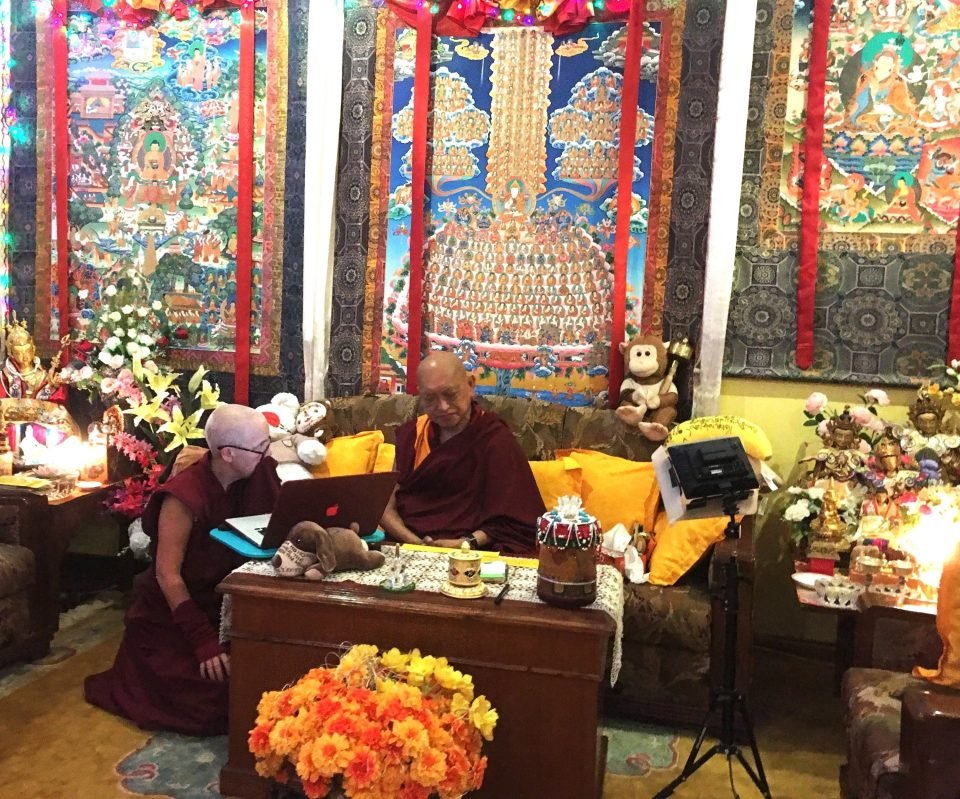
Ven. Joan Nicell looking at a translation with Lama Zopa Rinpoche, Kopan Monastery, 2020. Photo by Ven. Tenzin Tsomo.
We are so happy to share this recent report from the FPMT Translation Services team:
FPMT Translation Services was created in order to facilitate the translation of Tibetan texts used within the FPMT organization into English. Through the collaboration with experienced translators and our review and editorial policies, our aim is to make accurate translations of the invaluable textual heritage of our lineage available to students and practitioners worldwide and contribute to the fulfilment of the wishes and vision of Lama Zopa Rinpoche.
An exciting project in progress that we started earlier this year is the translation of an important Heruka Chakrasamvara Body Mandala commentary. This extensive and detailed commentary was given by Kyabje Trijang Rinpoche in 1975, in Dharamsala. Through the kindness of Lama Zopa Rinpoche, the Tibetan transcript of the teaching was thoroughly edited by a team of geshes and scholars. Following the publication of the edited manuscript in 2021, Rinpoche requested for it to be translated into English.
Much of the work of FPMT Translation Services is focused on the translation of practice texts requested by Lama Zopa Rinpoche, and on supporting translation projects directly commissioned by him. Two important practice text projects that we are currently working on are the translation of the Chittamani Tara sadhana, which is used for the Chittamani Tara nearing retreat, and of the extensive version of the Four Mandala Offering to Chitttamani Tara. The abbreviated version of the Four Mandala Offerings to Chittamani Tara is regularly used in FPMT group practice and Rinpoche had requested that the extensive version be made available as well.
FPMT Translation Services also reviews and updates practice texts to improve the accuracy of existing translations, when necessary. One such update that will be released soon is that of the Vajrayogini self-initiation text.
In our ongoing effort to publish FPMT Masters Program and Basic Program course materials, we are currently working on the editing and preparation of several draft translations. These include the Ornament of the Essence—Gyaltsab Darma Rinchen’s commentary on the Ornament of Clear Realization, as well as A Precious Garland—Abbot Dragpa Gyaltsen’s commentary on Shantideva’s Engaging in the Deeds of a Bodhisattva.
Some translation projects can take many years to complete. Our on-going long-term projects include the translation of the Ksitigarbha Ten Wheels Sutra, which we expect to release by the end of 2023, and translations and reviews of three different versions of the Sutra of Golden Light—namely, the 21-chapter, 29-chapter, and 31-chapter renditions.
We are also continuing work on the Sunlight that Causes the Lotus of Faith to Blossom: A Guidebook to the Supreme Sacred Place of Clear and Cool Mountain composed by Changkya Rolpai Dorje and his followers. The text is the most important Tibetan-language pilgrimage guide to Wutaishan, the sacred mountain of Manjushri in China, and an important sacred site for Tibetan, Chinese, and Mongolian Buddhists.
Although not a textual translation, an example of another type of project that we are also currently working on, at the behest of Lama Zopa Rinpoche, is the editing of a transcript of a compilation of commentaries given on the Six Yogas of Naropa by Gyume Khenzur Lobsang Jampa.
Some of the translations above will be released by FPMT Education Services while others will be published by Wisdom Publications. Several years ago, Wisdom in association with FPMT, began to publish a series of books entitled Wisdom Culture Series. “Wisdom culture” is an expression which was frequently used by Lama Yeshe to refer to a Dharma culture rooted in wisdom and compassion. The Wisdom Culture Series is intended to support this vision by making available to English-language readers previously unpublished translations of key works of masters within the lineage of Lama Tsongkhapa and the Gelug school of Tibetan Buddhism, as well as works by Lama Zopa Rinpoche himself.
Sponsorship of translations of these important and precious texts is available and welcome:
fpmt.org/support/translationfund
You can learn more about FPMT Translation Services and the extensive translation projects:
fpmt.org/education/translation
Foundation for the Preservation of Mahayana Tradition (FPMT), is a Tibetan Buddhist organization dedicated to the transmission of the Mahayana Buddhist tradition and values worldwide through teaching, meditation and community service.
14
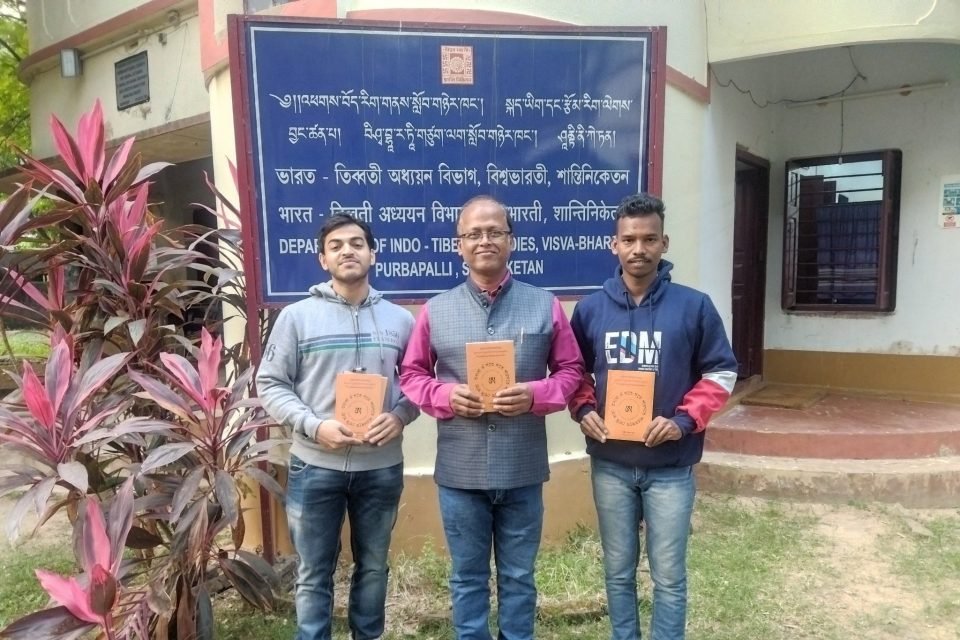
Students of Visva-Bharati University, Department of Indo-Tibetan Studies, West Bengal, India, proudly displaying translation of the Heart Sutra.
In 2022, US$121,634 in grants from the FPMT Education and Preservation Fund were provided to activities promoting the dialogue between Buddhist teachings and modern education and sciences, as well as translations of Dharma texts from Tibetan into Hindi and Bengali. We invite you to read some of the activities supported this year below and rejoice!
Translation Grants
US$3,400 in grants were provided for translation projects of Dharma texts from Tibetan into Bengali and Hindu. The project was conceived of by Professor Sanjib Kumar Das, from the Department of Indo-Tibetan Studies at Visva-Bharati University of West Bengal, India. West Bengal was the birthplace of great masters such as Shantideva, Lama Atisha, and Shantarakshita, and the intention for the translation projects was to aid in the revival of Mahayana Buddhism in the region. One translation was of the Sixteen Mahasthaviras and the Seven Successors of the Buddha from Tibetan into Bengali. The others are Bengali and Hindi translations of the Tibetan versions of Siddhānta Ratnāvalī and Prajnaparamitahr̥dayasūtra (Heart Sutra). The books were completed by teams of university translators and advisors.
Mind Science Academy Grants
The Mind Science Academy was created by Istituto Lama Tzong Khapa (ILTK) in Pomaia, Italy, after a 2014 request by His Holiness the Dalai Lama. His Holiness wished for the Institute to create a program that helps bridge the Buddhist Mind sciences into modern secular education. US$45,665 in grants were awarded to the academy to help support their activities in 2022. Among the programs the Mind Science Academy hosted this year included the European Summer Research Institute, a retreat that sought to “promote, connect, and build the community of contemplative science in Europe” by bringing together 116 scientists, educators, researchers and other professionals from around the world for a contemplative program at ILTK.
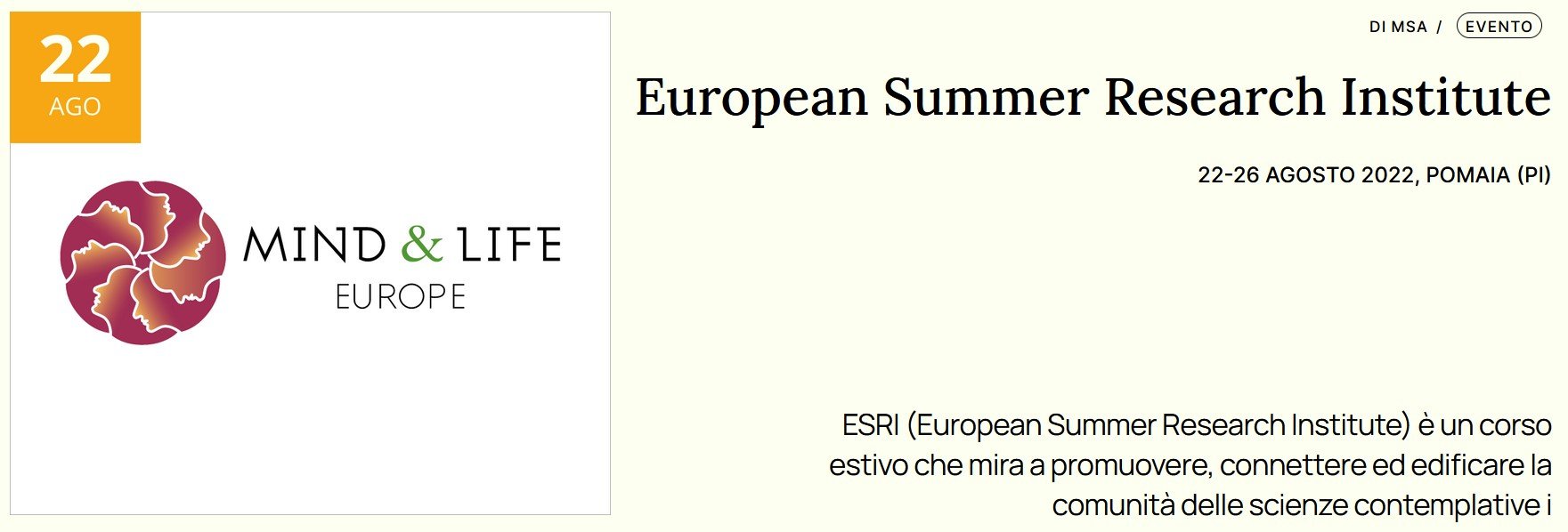
Mind Science Academy event posting for their August European Summer Research Institute retreat.
The Academy also collaborated with the University of Pisa to hold a week-long “Summer Camp” called Consciousness and Cognition, which was open to university students, scholars and those working in the field of psychology, psychotherapy and psychiatry. In July, an experiential program for meditation on emptiness was led by Ven. Sonam Wangchuk for experienced and novice meditators as well as university students. The 19-day retreat sought to bridge the Madhyamaka tradition and Western science for participants.
Foundation for the Development of Compassion & Wisdom Grants
Earlier this year, the Foundation for the Development of Compassion and Wisdom (FDCW) became the FPMT organization’s official hub of the Universal Education for Compassion and Wisdom pillar of service. The increased role for FDCW is to help more directly support local FPMT centers, projects and services with building their secular education programs based on universal human values such as kindness, humility, compassion, courage, and empathy.
The Education and Preservation Fund awarded FDCW a grant of US$69,135 this year to help with the Foundation’s operating costs. Some of the highlights of FDCW offerings this year included a six-part Compassion and Wisdom in Action webinar series. Using Lama Zopa Rinpoche’s Live with Compassion quote as the basis for the series, various speakers led discussions on bringing compassion into life activities such as work, meditation, death, facing problems, and joy. Other programs included the Big Love Summit 2022, and providing support and resources for FDCW-certified course facilitators.
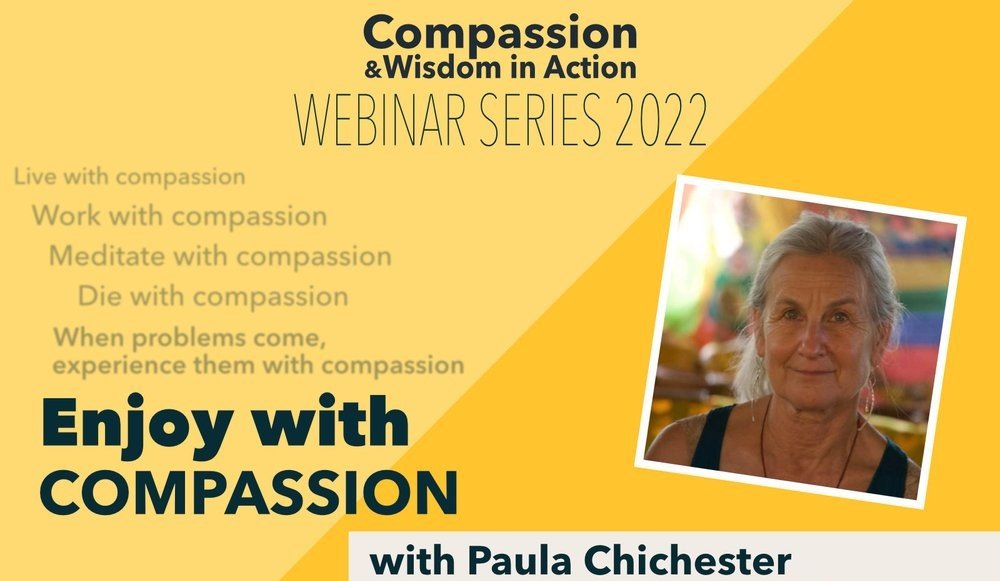
Announcement for the final webinar in the Compassion & Wisdom in Action Series. Photo courtesy of FDCW website.
In addition to these activities, FDCW’s director, Victoria Coleman, shared with us some of the Foundation’s resources available to all:
“FDCW has a broad range of resources to pull from. There are 100+ videos on topics like Reclaiming Joy, Kindful Communication, Self-compassion, Getting a Grip on Mind and much more. We are exploring new avenues like video clubs, values cafes, and discussion groups. There are 30 guided meditations on topics like compassion, universal love, courage, perceptions, joy, forgiveness, working with emotions. Some FPMT centers are offering weekly discussion groups using a new FDCW resource called Conversations That Matter. Check out FDCW’s blog for feedback on Conversations That Matter and how it’s impacting communities. FDCW is also focused on how to awaken kindness in children, teaching them about values so that they are equipped to handle the challenges of the modern world with a brave heart and wise mind.”
We rejoice in all these inspiring activities, the work of all those involved, and in the kind generosity of supporters to the Education and Preservation Fund, which provided the much-needed resources for these projects.
Learn more about the Education and Preservation Fund, and all of our FPMT Charitable Projects that are working to build a more compassionate world.
14
Continued Support to Prisoners Wishing to Study Dharma
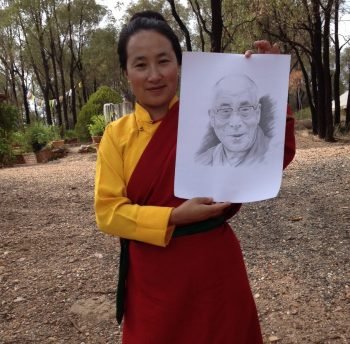
Khadro-la at Thubten Shedrup Ling Monastery with a drawing of His Holiness the Dalai Lama by one of LPPA (Australia) students. Photo courtesy of Liberation Prison Project.
Liberation Prison Project (LPP) is an FPMT international project founded in 1996 dedicated to supporting students around the world in prison who wish to study Dharma. Since its inception, LPP has helped thousands of prisoners worldwide study Buddha’s teachings and develop a sincere practice of Buddhism.
Over the years, LPP has offered hundreds of free subscriptions of Mandala to prisoners. This had been made possible due to the kindness of a benefactor, through Friends of FPMT who donated their subscriptions to prisoners, and through grants from the International Merit Box Fund. Most recently we were delighted to offer a grant from the Education and Preservation Fund to LPP in 2020 so that the teachings and articles in Mandala will continue to reach prisoner-students interested in exploring Buddhism via FPMT. As Mandala is no longer a print magazine and all content is being published online, LPP is now looking at ways to print either the complete magazine or selected articles and distribute them freely to those in prison who have committed to their Dharma practice.
Director Ven. Thubten Chokyi reports, “LPP will use the grant funds to print and distribute Mandala to LPP students. A lot of our time so far this year has been on distributing the Enjoy Life Liberated from Prison book, Liberation calendar and the higher demand for resources we get from prisoners typically in the first few months of the year.” Depending on the final costs for printing and mailing, LPP will determine how many copies of Mandala they will be able to send and how long this latest grant will last for this purpose.
Enjoy Life Liberated from the Inner Prison has been published as a fundraiser for Liberation Prison Project. This book is comprised of years of letters of advice Lama Zopa Rinpoche has given to prisoners on how to use their time in prison in the most meaningful way—to bring them to enlightenment.
Community Service, such as that provided by the Liberation Prison Project, is one of FPMT’s Five Pillars of Service.
Thanks to all who support the FPMT Education and Preservation Fund which enables grants like this to continue for the benefit of sincere practitioners wishing to enrich their Dharma education.
20
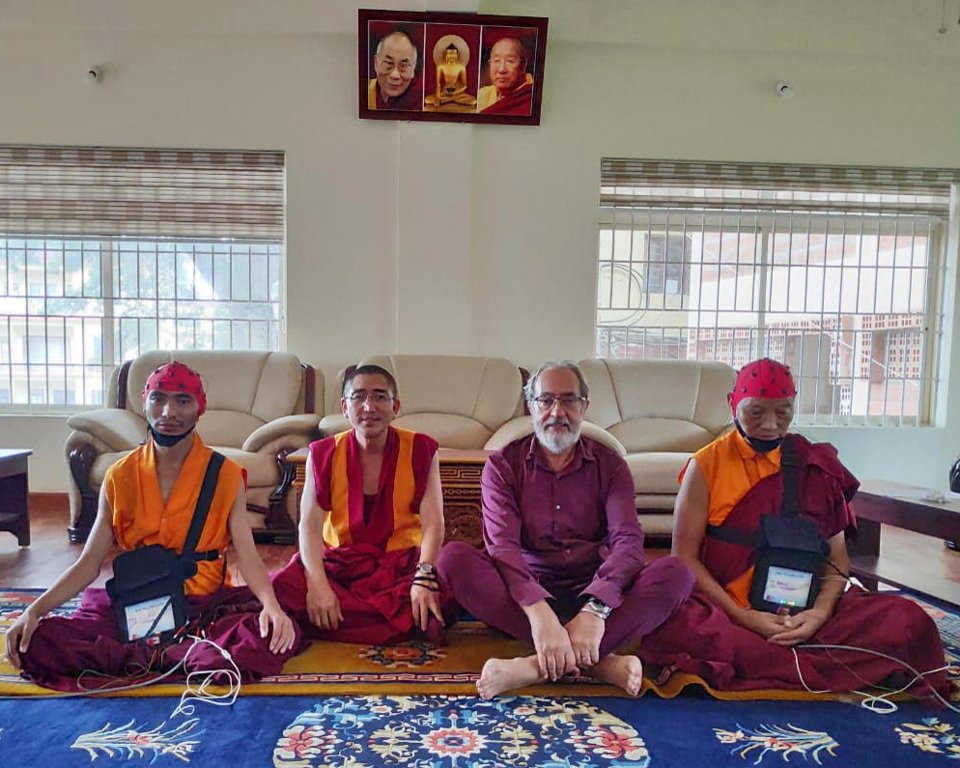
Monks from Sera Je Monastic University and University of Pisa Professor Bruno Neri are part of a collaborative research effort on meditation, which is connected to the work of Istituto Lama Tzong Khapa’s Mind Science Academy, Sera Je Monastery, India, 2019. Photo courtesy of Mind Science Academy.
When His Holiness the Dalai Lama visited Istituto Lama Tzong Khapa (ILTK) in 2014 he advised the FPMT center located in Pomaia, Italy, to create an academy focused on Buddhist mind science. Established in 1977, ILTK already had many successful Buddhist education programs. What His Holiness had in mind, however, involved the creation of a center of study where Buddhist knowledge was integrated with secular academic programs, thereby making ancient Buddhist wisdom available more broadly.
This vision has led to ILTK’s Mind Science Academy project. Our FPMT Education and Preservation Fund has been very happy to be able to support this important work and has contributed US$140,900 to the project to date. Filippo Scianna, the former director of ILTK who is currently overseeing the project, recently updated FPMT International Office on its progress.
In his report, Filippo shared four key points that inform the project. First, there is a lot of interest in the intersection of Buddhist mind science and Western science. This has been demonstrated by high levels of attendance for programs on this topic. Also, students appreciate and value academic accreditation, which is central to the Mind Science Academy plan. In addition, dialogues with university scholars lead to continued debate, research, and mutual enrichment. Finally, project organizers observe that when they establish relationships with the academic world they create paths to Buddhist philosophical study for people who might not otherwise be interested.
As part of the Mind Science Academy project, ILTK is collaborating with several universities in Italy. Since early 2016, ILTK has been working with the University of Pisa to create a Master’s program in neuroscience, mindfulness, and contemplative practice. Several cohorts have completed the program. Unfortunately, for 2020, the program had to be cancelled due to the pandemic. But in 2021, they have arranged for courses to be online and have seen more registrations than anticipated. ILTK staff are involved as teachers for the program. Many of the approximately 200 students who have done the program have shown an interested in more serious Buddhist study.
Also in 2021, a new specialized course has been created on the application of meditation practices in organizational contexts. The course, also offered through the University of Pisa, has a high level of registration for it. The project plans to have a summer school through the University of Pisa as well, which will be organized by ILTK. The summer school is attracting a lot of interest, including from students across several continents, and hopefully the pandemic will not prevent it from happening.
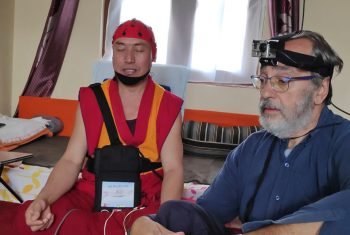
A Sera Je monk wearing equipment to monitor brain activity with Prof. Bruno Neri, part of a Sera Je Monastic University, India, and University of Pisa, Italy, partnership, 2019. Photo courtesy of the Mind Science Academy.
The Mind Science Academy project has also established relationships with the University of Florence and the University of Bologna. With the University of Florence, they have plans to do a course in the spring of 2022 that will include a Buddhist philosophical exploration of emotional functioning with practical applications for psychologists and health workers. At the University of Bologna, a collaboration is being developed that will include as a focus the use of meditation as a therapeutic support in hospitals and universities.
At ILTK itself, a new course has started that relates closely to the work of the Mind Science Academy. The three-year course covers the study of logic and debate, and how these methods of discerning truth relate to pedagogy and knowledge. More than a hundred people have enrolled in it.
Also, ILTK is organizing a conference for June 2021 entitled “Reality Is Not as It Appears.” Geshe Namdak, the resident geshe at Jamyang Buddhist Centre in London, UK, will attend as will several university professors. New research on meditation conducted by the University of Pisa in collaboration with Sera Je Monastic University in India will also be presented at the conference.
Filippo writes that collaborating with the universities overall has been a good experience and has already given many people in the academic world access to Buddhist principles and teachings. He also sees potential for other FPMT centers to develop programs involving universities in their local areas and wants to share the information he’s learned as part of working on this project. We’ll be exploring this in more detail in future Mandala stories.
For more information on the Mind Science Academy and Istituto Lama Tzong Khapa, please visit their website (www.ILTK.org).
Learn more about the FPMT Education and Preservation Fund.
Read archive Mandala stories on the Mind Science Academy: “Building A Bridge: The Academy of Mind Science and Valid Cognition at Istituto Lama Tzong Khapa” and “Ancient Indian Wisdom for the Modern World.”
- Tagged: Education and Preservation Fund, filippo scianna, istituto lama tzong khapa, mind science academy
31
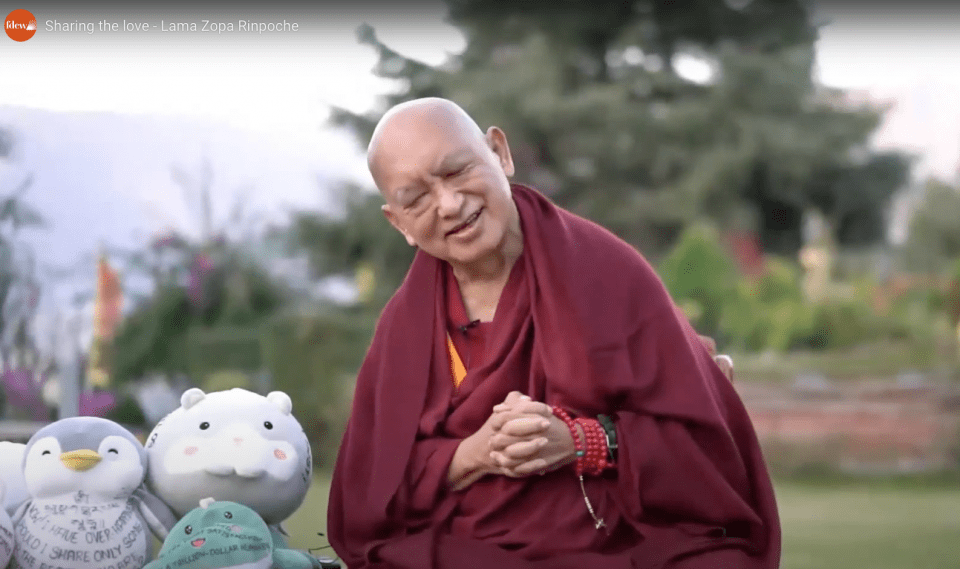
Screenshot of Lama Zopa Rinpoche speaking during the online Big Love Festival, 2020.
In 1983 Lama Yeshe began formulating the idea of Universal Education: “The world needs a new system of education because the old one is too dated for the intelligent people of today and produces a great deal of conflict and dissatisfaction in the present generation. We have to get rid of people’s old concepts and give them a new imagination; a new, broad way of looking at themselves and the world. That’s what I mean by ‘universal.’”
The Foundation for Developing Compassion and Wisdom (FDCW) was established under these principles as a global charity based in London in 2005. Since then FDCW has provided secular training, programs, and resources across many sectors of society—schools, universities, hospices, workplaces, healthcare, youth groups, and community centers. Lama Zopa Rinpoche, FDCW’s Honorary President, continues to support Lama Yeshe’s vision.
You can watch Lama Zopa Rinpoche discussing “What is Universal Education” during the 2020 Big Love Festival:
https://youtu.be/XaAN7Qq9mTs
Courses have reached thousands of people across the world through a growing network of facilitators in more than twenty countries.
The Education and Preservation Fund offered a grant to FDCW toward the operating costs for the year. We were delighted to support their work and invest in the legacy of Lama Yeshe’s wish for Universal Education, which is also one of the Five Pillars of Service within the FPMT organization: (Dharma, Universal Education for Compassion and Wisdom, Social and/or community service, Interfaith activities, Revenue generation activities).
Here are some highlights of what FDCW was able to accomplish with the help of this grant in 2020:
- All courses and programs were converted to online delivery as well as in-person delivery.
- Training was offered to facilitators on how to deliver effectively online.
- Twenty online courses and trainings were delivered plus a 16 Guidelines course that was offered online to twenty young women in Nepal.
- 16 Guidelines for Life book is available now as an e-book in Spanish and English from the FDCW website.
- Free online sessions called “Coming Together” provided community support during the pandemic.
- Seven online Forums for our Facilitators were delivered for peer to peer learning and continued professional development.
- Twenty-seven facilitators were trained to deliver the new Unlocking Your Potential course.
- The Big Love Festival was held online this year due to COVID-19 restrictions. All the recordings of talks now available for free via our website (https://www.compassionandwisdom.org/sharing-the-love).
Plans for 2021 include:
- Development commenced on a new series of courses to train people in Universal Education values and facilitation skills in areas including neuroscience, group facilitation skills, and course adaptation. The first course is Discovering the Wisdom of Neuroscience, which launched in February 2021 with fifty participants worldwide (see poster) for people with a general interest in neuroscience and those who want to develop their experience and knowledge in this area to better support others.
- Offering free resources and webinars on the FDCW website.
- Exploring new ways of delivering courses online and working on a new online learning platform to make our courses truly universally and globally accessible.
- Building a global community based on Universal Education and universal ethical values and enabling local connections and groups to emerge. To achieve this, FDCW is working on an interactive map of FDCW facilitators and Universal Education ambassadors; developing a range of free resources to support local UE groups; and planning the next online summit for November 2021, building on the success of the Big Love Festival.
Big Love Festival 2020
Victoria Coleman, Executive Director of FDCW, shares the story of the Big Love Festival, November 2020:
When we at FDCW first began discussing the idea of a global online summit during summer 2020, I had serious doubts. It seemed such a huge stretch for our tiny team, but I felt inspired by Lama Yeshe, the founder of Universal Education. He always thought big! And so the idea for the Big Love Festival was born.
Lama Yeshe first spoke about Universal Education nearly forty years ago, and our vision for the festival was to celebrate what had been achieved since then. We wanted to include speakers who knew Lama Yeshe and also those who had been inspired to breathe Universal Education into life.
As soon as we reached out, we were encouraged by the initial response and support we received and soon the confirmed list of speakers began to grow. Our honorary president Lama Zopa Rinpoche agreed to offer the opening talk on “What is Universal Education?” and Tenzin Ösel Hita, Professor Jan Willis, and Ven. Robina Courtin kindly accepted our invitation to speak.
Just a few weeks before the start of the festival, we received a message of support from our patron, His Holiness the Dalai Lama, who said, “I offer my good wishes to you all on the occasion of the Big Love Festival celebrating forty years of effort in the area of Universal Education by the Foundation for Developing Compassion and Wisdom.” We felt elated to be able to share his encouraging words. It felt like a rocket boost of positive energy.
When the festival arrived, I was immediately blown away by the number of people who joined the sessions both live on Zoom and via our Facebook livestream. The most popular sessions reached over a thousand live viewers worldwide! The broad range of topics presented by the speakers truly captured Lama Yeshe’s big and bold vision for Universal Education.
I felt very moved by the heart, quality, and courage that all speakers brought to their talks. I found it so inspiring. As one participant said, “The warmth and energy of the sessions was palpable.” Although each presenter approached Universal Education from their own perspective and experience, common threads shone through—sincerity, the desire to share, vulnerability, and mental clarity. It truly felt like Big Love.
Looking back, the Big Love Festival radiated positive energy that seemed to build in resonance as the week unfolded. We would like to thank all the speakers and the facilitators who moderated the sessions. Without their support the Big Love Festival would not have been possible. A very special note of thanks goes to all the translators who approached us when they heard about the festival and made it possible to offer translations into French, Italian, Spanish, Portuguese, Russian, and Chinese for many of the talks.
We are committed to making this an annual event and have already started planning the 2021.
For a full list of Big Love Festival speakers as well as recordings of all thirteen talks, visit:
www.compassionandwisdom.org/sharing-the-love
The Education and Preservation Fund supports Dharma study and contributes to the development of Buddhist education programs and the preservation of the Dharma through the publication of Dharma practice materials and translations.
- Tagged: big love festival, Education and Preservation Fund, five pillars, foundation for developing compassion and wisdom, universal education
19
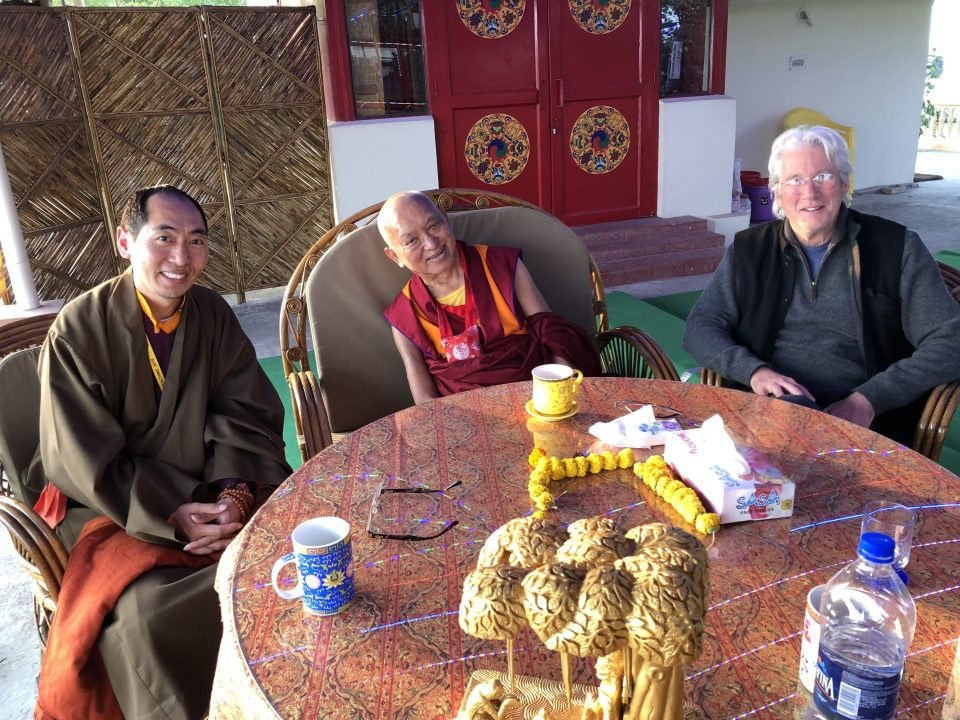
Lelung Rinpoche, Lama Zopa Rinpoche, and Richard Gere, Bodhgaya, India, January 2018. Photo by Ven. Roger Kunsang.
Lelung Rinpoche was born in 1970. When he was twelve years old he visited Kyabje Ling Rinpoche and following Ling Rinpoche’s advice, he went to study at Drepung Monastery, India. Two years later, he went to Dharamsala to receive teachings from His Holiness the Dalai Lama. During this visit, His Holiness recognized him as being the eleventh incarnation of Lelung Pema Zhepai Dorje.
Lelung Rinpoche completed his studies at Drepung Monastery at the age of 24 when he received a Geshe degree. In 1993, Lelung Rinpoche met the only master alive who held the complete teachings of Dakini Sangwa Yeshe before they were forever lost. Rinpoche received the oral transmission from that master. To carry on this lineage of teachings, he founded Lelung Dharma Trust.
One of the very important projects of Lelung Dharma Trust is the Geden Phacho Bhucho Preservation Centre (GPBPC). This was conceived of by Lelung Rinpoche and has been widely applauded and endorsed by many great masters and tulkus of the Tibetan Buddhist tradition. His Holiness the Dalai Lama is the Supreme Patron of the project and Professor Samdhong Rinpoche is the Honorary Patron. The goal of GPBPC is to preserve the sanctity and purity of the teachings of the Buddha for present and future generations. Since its inception in 2006, the following objectives have been realized:
- Establishment of main office and reference catalogue. In August 2006, an office was established in Dharamsala, India, to act as a base for the huge task of collecting data and vital research so that the initial stage of the project could begin.
- Conferences and programs of rare oral transmissions and teachings.
In the broader framework of the project, two phases remain:
- Phase One. Identification of the lineage holder/master, the disciple, and the transmission of lineages. Rare teachings held by authentic lineage holders will be prioritized.
- Phase Two. Completion and follow-up. Once the existing lineages are successfully transmitted from their holders to qualified students, the project will be said to be complete, but ongoing maintenance will be required to keep the reference catalogue up to date.
Lama Zopa Rinpoche has a close connection with Lelung Rinpoche and recently has received a number of oral transmissions from him. Lama Zopa Rinpoche considers the work that Lelung Rinpoche is undertaking, especially under Geden Phacho Bhucho, as very important for the preservation of Mahayana Dharma.
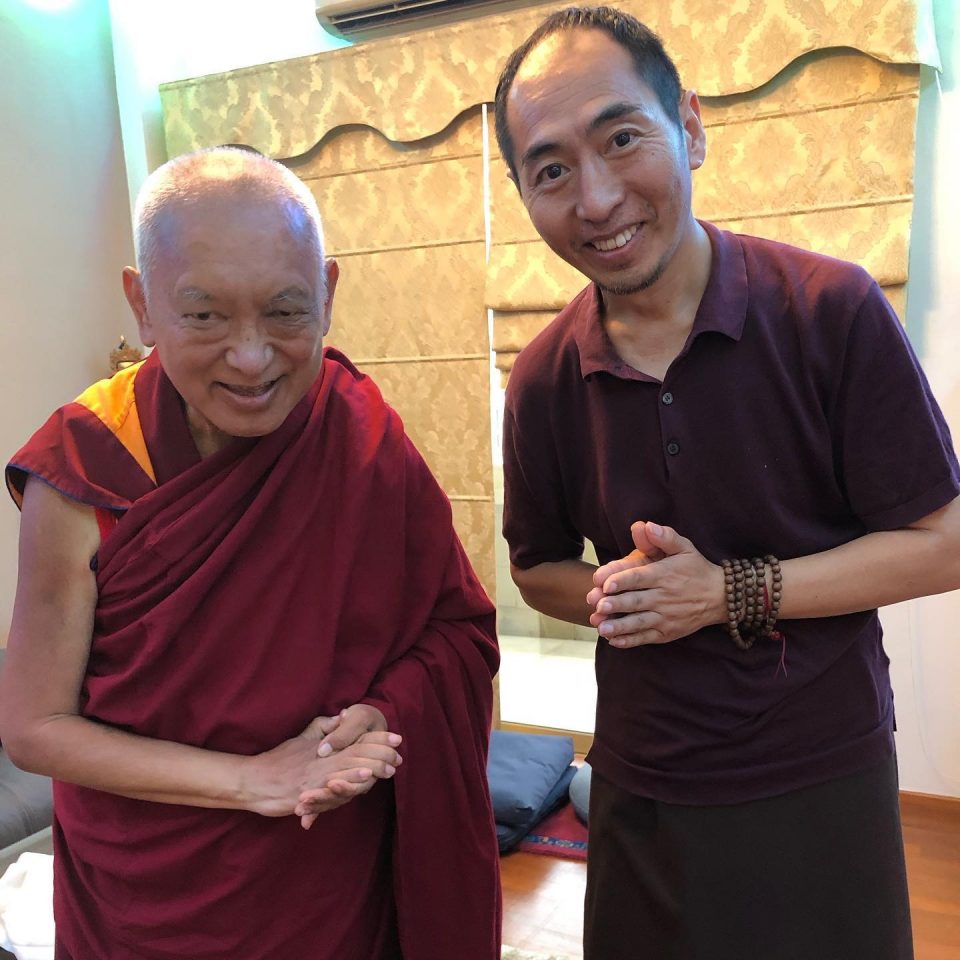
Lama Zopa Rinpoche with Lelung Rinpoche. Photo by Ven. Roger Kunsang in Singapore, 2019
Recently Lama Zopa Rinpoche offered, through The Education and Preservation Fund, sponsorship for the printing of an extremely rare commentary on the Prajñaparamita in 8,000 Verses that Lelung Rinpoche found and then arranged to be printed and distributed in India.
Lama Zopa Rinpoche also has committed to sponsor the salary of two geshes for two years. These geshes are undertaking an extremely important task under GPBPC. They are are researching the Senyigs (List of Hearing Texts) by different masters in order to find out existing rare empowerments, oral transmissions, personal instructions and then to find the living masters who hold these lineages.
They will also search for the texts if they are not commonly available. If the texts are not in common font (Ume) then they will transcribe the texts into the common font (Uchan). Once all this has been completed then the GPBPC office will organize teachings in order to pass on the lineages to the younger generation. Also, if there are very rare texts they will organize the publishing of these in order to make them more widely available.
In addition, the geshes will add more information to the current index (which GPBPC has created) which holds information on the texts, authors, oral transmissions, personal instructions, who possesses the empowerments, whether those teaching lineages are still alive or extinct and also a list of the names in the teaching lineage.
The importance of pure lineage transmission in the form of Buddhism practiced in Tibet is immense. It ensures a stream of undiluted blessing from the Buddha himself to contemporary students and is considered essential for the ultimate realization of Buddhahood. If a lineage is broken, then the teachings themselves are threatened. Without qualified teachers giving correct personal oral transmissions, the extraordinary blessings, enlightened understanding, and spiritual energy of previous masters cannot be passed on effectively.
Lama Zopa Rinpoche has been offering support when he can to the important undertakings of Lelung Rinpoche, that preserve Lama Tsongkhapa’s lineage for future generations, and are vital for the continuation of the Buddha Dharma in an unbroken form.
Thank you to the kindness of a generous donor who made many of these offerings possible, and please rejoice that FPMT is able to offer support in this way to such important projects benefiting the Buddhism.
The Education and Preservation Fund supports Dharma study and contributes to the development of Buddhist education programs and the preservation of the Dharma through the publication of Dharma practice materials and translations.
13

Flowers at Buddha Amitabha Pure Land, Washington, US, 2015. Photo by Chris Majors.
Thanks to a kind benefactor, the Education and Preservation Fund issued several grants earlier this year in support of Liberation Prison Project, an FPMT project founded in 1996, which offers spiritual advice and teachings, as well as books and materials, to people in prison interested in exploring, studying and practicing Buddhism. In total, US$44,100 was offered to programs in the United States, Australia, New Zealand, the United Kingdom, France, Italy, and Mexico.
Approximately 300 Dharma friends correspond with prisoner students worldwide. On average, 2,000 inmates are supported with Dharma materials every year.
These grants will contribute to the costs of postage, Dharma resources, printing, design needs, computer upgrades, subscriptions to Mandala magazine, and pujas for success at Kopan monastery.
Please rejoice in the ongoing work of the Liberation Prison Project and in the generosity of the donor who made these recent grants possible. Community Service, such as that provided by the Liberation Prison Project, is one of FPMT’s Five Pillars of Service.
The Education and Preservation Fund supports Dharma study and contributes to the development of Buddhist education programs and the preservation of the Dharma through the publication of Dharma practice materials and translations.
- Tagged: liberation prison project, prison, prisoners
7
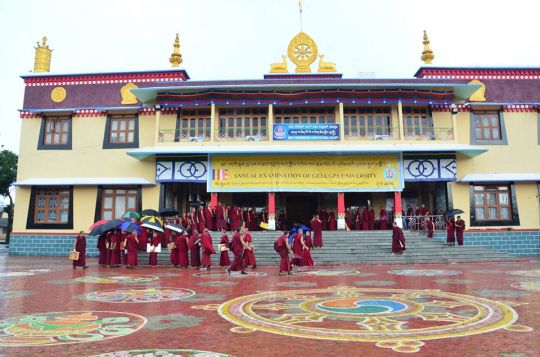
Monks participating in the annual Winter Jang Debate.
This January, monks from various Gelug monasteries participated in an extensive twenty-two day debate on Buddhist logic in Bodhgaya, India, known as the Winter Jang Debate.
This annual debate dates back to the time of Lama Tsongkhapa and was continued each year until 1959. In 1981 the present and former abbots of the three great monasteries met to revive this debate. However, due to costs the monasteries were only able to sponsor about 200 monks to attend. Seeing the incredible importance of this tradition of bringing together the best scholars to hone their understanding of the Buddha’s highest teachings, Lama Zopa Rinpoche, through the Lama Tsongkhapa Teachers Fund, now sponsors 400 monks from Sera Je Monastery to attend. This expenditure includes: bus rentals to transport the monks to and from Bangalore; train accommodation to and from Bangalore to Bodhgaya; floor mats for the monks; food offering; as well as the expenses associated with three professors, two teachers, and four monitors to attending.
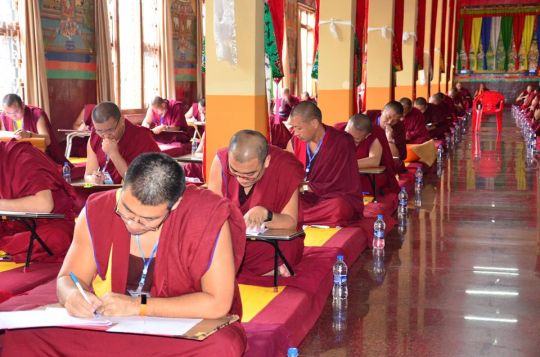
Monks during examination.
The Sera Je Monastery Office sent a sincere letter of thanks to Lama Zopa Rinpoche as well as a request for Rinpoche to remain among us for “hundreds and hundreds of eons” for the sake of “Buddha’s teachings and all sentient beings….Rinpoche’s support of the annual Winter Debate continues to benefit the monks immensely. We are all extremely grateful to Rinpoche for this generous support as well as the continual offering to the top position students who passed their Special Memorization Exam. Tremendous thanks from all of the monks…. Just as we have been blessed with Rinpoche’s kind attention and support in the past please allow us to rquest Rinpoche’s kind support in the future too.”
Additionally this year, annual sponsorship was offered to Sera Je Monastery for 190 monks who qualified and passed the yearly Special Memorization Examination.
- 68 monks memorized Commentary on the Ornament of Clear Realization
- 74 monks memorized The Essence of Eloquence on the Art of Interpretation by Lama Tsongkhapa
- 62 monks memorized Bodhisattvacaryavatara (Guide to the Bodhisattva’s Way of Life) by Shantideva
- 9 monks memorized A Presentation of General Meaning
- 3 monks memorized General Meaning (of the) Middle Way
- 2 monks memorized Six Treatises on the Middle Way by Nagarjuna
- 1 monk memorized Five Treatises of Maitreya
A new set of robes was offered to these future teachers who contribute to the preservation the Lama Tsongkhapa tradition of Tibetan Buddhism in the monasteries. The memorization of these monumental works is truly something to rejoice in.
The grants toward the Winter Jang Debate and the Special Memorization Examination totaled US$26,959 this year.
Tremendous thanks to the many donors who support the Lama Tsongkhapa Teachers Fund enabling FPMT to sponsor the monks engaging in debate and memorization at this high level for the benefit of all. You are welcome to participate in this offering at any time.
You can learn more about the beneficial activities of the Lama Tsongkhapa Teachers Fund or the many Charitable Projects of FPMT.
27
In 1976, Geshe Lhundub Sopa, one of Lama Zopa Rinpoche’s teachers, began offering commentary to Lama Tsongkhapa’s Lamrim Chenmo. The lamrim, or “graduated path,” is a presentation of Shakyamuni Buddha’s teachings that detail the stages on the complete path to enlightenment.
Geshe Sopa’s teachings continued into the early 1990s. In 1994, discussions on turning the audio teachings into a book series commenced. And in 1995, Lama Zopa Rinpoche took on the responsibility of sourcing the project’s funding. Shortly after, a very kind benefactor came forward to sponsor it. In all, US$500,000 was raised for this incredible project.
Over the next twenty-three years, Wisdom Publications published a five-volume series called Steps on the Path to Enlightenment. Producing these volumes involved laborious effort on the part of translators, transcribers, and editors—not to mention that each editor read their drafts to Geshe Sopa many times, incorporating his feedback and refinements. The result is the longest and most detailed lamrim commentary available in English.
Steps on the Path to Enlightenment, Vol. 1: The Foundational Practices; Vol. 2: Karma; Vol. 3: The Way of the Bodhisattva; Vol. 4: Śamatha; and now Vol. 5: Insight are currently available through Wisdom’s website.
The final and longest volume in the series focuses on the nature of reality. In addition to the teachings themselves, the book features an extensive glossary of technical terms.
Wisdom’s senior editor, David Kittlestrom, commented on the volume: “Dechen Rochard has brought enormous precision and devotion to the project, preserving the many levels of subtlety on the different points of the Madhyamaka view in Geshe-la’s exposition to create an unparalleled guide to the sixth perfection and Tsongkhapa’s text. And what makes it all the more remarkable is how readable and cogent the work is—it’s a pleasure to read. It is a wonderful tribute to Geshe-la’s great erudition and kindness.”
All are welcome to order Steps on the Path to Enlightenment, Vol. 5: Insight directly from Wisdom Publications now.
Please rejoice in the completion of this incredible project decades in the making!
“Lamrim is what you should focus on your whole life, even while you are doing your job. This is what you should keep your mind in, this is the most meaningful, most profound practice, doing each act with the mind in bodhichitta. This should be your practice, this is what you should try to accomplish in this life.” —Lama Zopa Rinpoche
You can learn more about the Steps on the Path to Enlightenment series by Geshe Lhundub Sopa: www.wisdompubs.org/author/geshe-lhundub-sopa
- Home
- News/Media
- Study & Practice
- About FPMT Education Services
- Latest News
- Programs
- New to Buddhism?
- Buddhist Mind Science: Activating Your Potential
- Heart Advice for Death and Dying
- Discovering Buddhism
- Living in the Path
- Exploring Buddhism
- FPMT Basic Program
- FPMT Masters Program
- FPMT In-Depth Meditation Training
- Maitripa College
- Lotsawa Rinchen Zangpo Translator Program
- Universal Education for Compassion & Wisdom
- Online Learning Center
- Prayers & Practice Materials
- Overview of Prayers & Practices
- Full Catalogue of Prayers & Practice Materials
- Explore Popular Topics
- Benefiting Animals
- Chenrezig Resources
- Death & Dying Resources
- Lama Chopa (Guru Puja)
- Lama Zopa Rinpoche: Compendium of Precious Instructions
- Lama Zopa Rinpoche: Life Practice Advice
- Lama Zopa Rinpoche Practice Series
- Lamrim Resources
- Mantras
- Prayer Book Updates
- Purification Practices
- Sutras
- Thought Transformation (Lojong)
- Audio Materials
- Dharma Dates – Tibetan Calendar
- Translation Services
- Publishing Services
- Teachings and Advice
- Find Teachings and Advice
- Lama Zopa Rinpoche Advice Page
- Lama Zopa Rinpoche: Compendium of Precious Instructions
- Lama Zopa Rinpoche Video Teachings
- ༧སྐྱབས་རྗེ་བཟོད་པ་རིན་པོ་ཆེ་མཆོག་ནས་སྩལ་བའི་བཀའ་སློབ་བརྙན་འཕྲིན།
- Podcasts
- Lama Yeshe Wisdom Archive
- Buddhism FAQ
- Dharma for Young People
- Resources on Holy Objects
- Ways to Offer Support
- Centers
- Affiliates Area
- Teachers
- Projects
- Charitable Projects
- Make a Donation
- Applying for Grants
- News about Projects
- Other Projects within FPMT
- Support International Office
- Projects Photo Galleries
- Give Where Most Needed
- FPMT
- Shop
Translate*
*powered by Google TranslateTranslation of pages on fpmt.org is performed by Google Translate, a third party service which FPMT has no control over. The service provides automated computer translations that are only an approximation of the websites' original content. The translations should not be considered exact and only used as a rough guide.By eliminating the self-pitying imagination of ego, you go beyond fear. All fear and other self-pitying emotions come from holding a self-pitying image of yourself.







